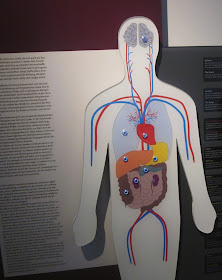Long before I saw Tim Burton and Johnny Depp's somewhat creepy interpretation of
Charlie and the Chocolate Factory (2004), and even before I saw Gene Wilder sing his way through
Willy Wonka and the Chocolate Factory (1971), I read and loved Roald Dahl's children's classic
Charlie and the Chocolate Factory (1964).
I think I can at least partially blame my obsession with chocolate on this wonderful tale of a very poor boy who wins a chance to tour the never-before-entered chocolate factory that is just down the street from his house.
Of course, everyone in town wants to find one of the five golden tickets that are hidden in candy bars and that will give the bearer entry into the chocolate factory. Charlie, who has very little money, has also very little chance of finding one of those tickets. However, as Dahl points out, “There was one other thing that the grown-ups also knew, and it was this: that however small the chance might be of striking lucky, the chance is there. The chance had to be there.” And Grandpa Joe reminds Charlie, "I've heard tell that what you imagine sometimes comes true."
Just like Charlie, some of my dreams came true this past summer on our family cruise on the Rhine River. It was a trip we never thought would actually happen, and it was every bit as fun as Charlie's encounters with the Oompa Loompas.
It didn't hurt that our trip included a trip to a real live chocolate factory. (Okay, it was really a museum, but close enough, right?) Surrounded on three sides by the Rhine, at first we didn't know what this odd mish-mash of buildings was. From one end it looked like a barge:
From the other end it looked like an old castle:
Ah, but then I saw some German words I recognized:
Cologne, birthplace of the
Stollwerck Chocolate Company, is the chocolate heart of Germany. At one time it was the second largest supplier of chocolate to the United States. This museum began as an exhibit to celebrate the 150th anniversary of Stollwerck's, even though the company moved out of Cologne in 1975. The exhibit was so popular that it was expanded into a full museum in 1993 and has since become a major tourist attraction, drawing over five million visitors a year.
There were interesting exhibits about chocolate sources around the world.
. . . . and about the
many health benefits of chocolate:
There was an automated chocolate production line that was fun to watch:
. . . and at the end a very tall Oompa Loompa gave us a piece of chocolate:
The museum had the biggest chocolate fountain I have ever seen, fashioned to look like a giant cocoa tree:
Another Oompa Loompa stood at the edge of the chocolate pool, dipping vanilla wafers for guests to sample.
The prow of the chocolate "boat" was graced by a statue of what I think must be the Pope, a bit of a non sequitur. Does the Pope like chocolate? I'm sure he does. He
is German, after all.
Too bad I couldn't fit this ginormous chocolate bar into my suitcase:
There was also a "build-your-own chocolate bar" counter. Customers selected from among thirty-five ingredients:
. . . and watched while yet another Oompa Loompa crafted their customized bar:
Yeah, I was
all over that:
Besides the chocolate-making process, there were lots of exhibits on chocolate making through the ages. I loved these antique chocolate molds:


I want a set of nativity chocolate molds. Wouldn't that be a fun Christmas project?

This book on the history of chocolate is dated 1643:
Antique chocolate dispensaries and advertisements were on display:
. . . along with chocolate packaging through the years:
A sign noted the important fact that until 1936, Milka chocolate was advertised with a St. Bernard, but since 1973, the "Lilac cow" has decorated the wrapper:
I'm pretty sure I could eat that Lindt Lindor chocolate ball all by myself:

Classic chocolate advertising signs:
There were very unique chocolate vending machines, including a stork and Hansel and Gretel in the witch's cottage:
There was not-so-politically-correct advertising for Sarotti chocolate from an era when Germany had chocolate-producing African colonies:
Bob, you can give me this kind of bouquet any time:
I admired this excellent chocolate delivery system, much like our ice cream carts.
We exited the museum through--what else?--the gift shop. I'll end this post with some mouth-watering items that were for sale:
Yeah, this is me.
"My therapist told me the way to achieve true inner peace is to finish what I start. So far today, I have finished 2 bags of M&M's and a chocolate cake. I feel better already.”
― Dave Barry





































































